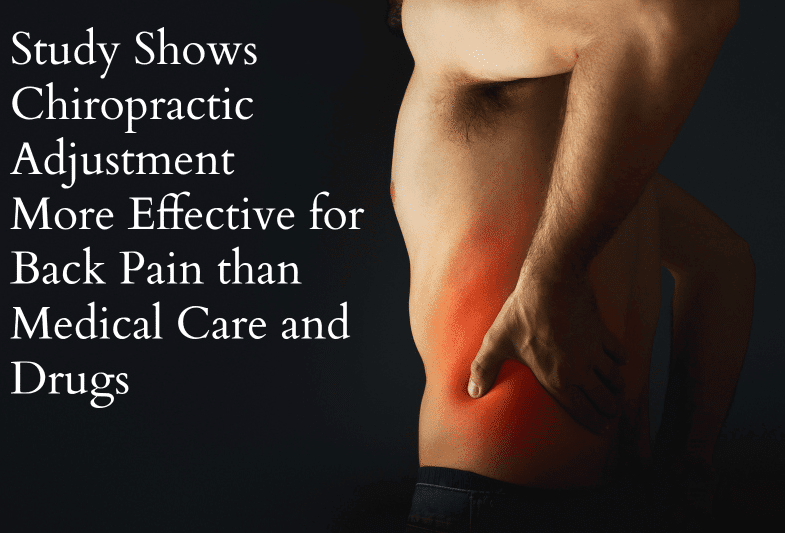El Paso, TX. Chiropractor Dr. Alex Jimenez adds to the discussion of chiropractic treatment vs. pain medication and medical care.
Table of Contents
Which Is More Effective For Low Back Pain? Meds Or Chiropractic?
That is the question in our research theme of the week.
A Practice-Based Study of Patients with Acute and Chronic Low Back Pain Attending Primary Care and Chiropractic Physicians: Two-Week to 48-Month Follow Up
This study based used a practice-based, observational model to look at the effectiveness of intervention in a selected group of patients with both acute and chronic lower back pain (LBP). It compared the efficacy of chiropractic intervention with standard medical care in both kinds of Low Back Pain.
2780 patients were enrolled in the research over a 2-year period (1994 to 1996) from the practices of 60 DCs (1855 patients) and 111 MDs (925 patients) in 51 chiropractic and 14 general practice clinics. Patient data was obtained via a survey distributed in person at the first visit, and the patients were followed up over a period of 4 years with 7 mailed surveys at regular time intervals. Mailings were sent at 2 weeks, 1 month, 3 months, 6 months, and 1 year following the original visit. In phase 2, patients were followed up at 36 24, and 48 months.

Patients were eligible if LBP was their primary grievance, and was of mechanical source; they were excluded if exploitation was contraindicated, or the back pain was of nonmechanical origin (such as from organic referred pain). Acute patients were those whose back pain was of less than 7 weeks duration; long-term back pain patients were those whose back pain was longer or of 7 weeks duration.
The physicians in the research produced an assortment of treatment procedures. Chiropractic care included physical therapy, spinal manipulation, an exercise strategy, and self-care education. Medical doctors gave care that included an exercise plan prescription drugs, and self-care advice; nearly 25% of these patients were referred for physical therapy.
The primary outcomes measured were present pain severity, and functional impairment, which were quantified by questionnaires sent to the patients in the above stated times.
The medical patients showed more severe baseline pain and disability when entering treatment, greater prevalence of pain and poorer general health status, than in patients. These differences were more conspicuous in the chronic patients than in the acute patients.
An edge was seen for DC attention in comparison with MD attention for the first 12 months in pain relief. This difference was small but was greater for those with chronic LBP during the first year of treatment.

There was an advantage with all the usage of chiropractic care in long-term patients with pain radiating below the knee, and some small advantages were also seen in the acute patient group. Differences were also seen through the first 3 months of care with no leg pain in chronic patients. There were the 2 kinds of medical care for pain radiating over the knee as well as no differences in the 2 groups.
All patient groups found clinically important improvement in pain and disability over the span of treatment. Advancement that was greater was seen by acute patients, with many obtaining near complete relief of their symptoms. Most realized symptom relief by 3 months, followed by a plateau through 12 months. It was followed by critical, clinical aggravation of pain at 12 to 24 months, with another plateau until 4 years. Little upsurge in impairment was seen between 12 and 48 months.
Of note, at 3 years into the research, 45% to 75% of patients noted at least 30 days of pain throughout the prior year, even in those who had gained significant pain and disability relief through early intervention. Daily pain was noted by 19% to 27% of chronic LBP patients throughout the preceding year.
- Early intervention reduces chronic pain. People who received early intervention for acute lower back pain after the original injury, reported fewer days of back pain than those who waited more for intervention. Since outcomes were better than in those who delayed treatment this would support providing early intervention for patients with acute back pain.
- Chiropractic is valuable for certain types of pain. Chiropractic care was shown to be more effective than standard medical care in certain situations: with pain radiating below the knee in patients with persistent lower back pain, as well as for treating LBP during the first 12 months. Nearly all the relief was sustained throughout the initial year, and was obtained during the first 3 months of treatment.
This study reports pain and disability results up to 4 years for chiropractic and medical patients with low back pain (LBP) and evaluates the impact of physician kind and pain length on clinical outcomes.

Conclusion
Study findings were consistent with systematic reviews of the efficacy of spinal manipulation (the Chiropractic adjustment) for pain and disability in severe and chronic LBP. Interdisciplinary referral and patient selection needs to be prime concerns by policymakers, physicians, and third-party payers in identifying health services.

Post Disclaimer
Professional Scope of Practice *
The information on this blog site is not intended to replace a one-on-one relationship with a qualified healthcare professional or licensed physician and is not medical advice. We encourage you to make healthcare decisions based on your research and partnership with a qualified healthcare professional.
Blog Information & Scope Discussions
Welcome to El Paso's Premier Wellness and Injury Care Clinic & Wellness Blog, where Dr. Alex Jimenez, DC, FNP-C, a board-certified Family Practice Nurse Practitioner (FNP-BC) and Chiropractor (DC), presents insights on how our team is dedicated to holistic healing and personalized care. Our practice aligns with evidence-based treatment protocols inspired by integrative medicine principles, similar to those found on this site and our family practice-based chiromed.com site, focusing on restoring health naturally for patients of all ages.
Our areas of chiropractic practice include Wellness & Nutrition, Chronic Pain, Personal Injury, Auto Accident Care, Work Injuries, Back Injury, Low Back Pain, Neck Pain, Migraine Headaches, Sports Injuries, Severe Sciatica, Scoliosis, Complex Herniated Discs, Fibromyalgia, Chronic Pain, Complex Injuries, Stress Management, Functional Medicine Treatments, and in-scope care protocols.
Our information scope is limited to chiropractic, musculoskeletal, physical medicine, wellness, contributing etiological viscerosomatic disturbances within clinical presentations, associated somato-visceral reflex clinical dynamics, subluxation complexes, sensitive health issues, and functional medicine articles, topics, and discussions.
We provide and present clinical collaboration with specialists from various disciplines. Each specialist is governed by their professional scope of practice and their jurisdiction of licensure. We use functional health & wellness protocols to treat and support care for the injuries or disorders of the musculoskeletal system.
Our videos, posts, topics, subjects, and insights cover clinical matters and issues that relate to and directly or indirectly support our clinical scope of practice.*
Our office has made a reasonable effort to provide supportive citations and has identified relevant research studies that support our posts. We provide copies of supporting research studies available to regulatory boards and the public upon request.
We understand that we cover matters that require an additional explanation of how they may assist in a particular care plan or treatment protocol; therefore, to discuss the subject matter above further, please feel free to ask Dr. Alex Jimenez, DC, APRN, FNP-BC, or contact us at 915-850-0900.
We are here to help you and your family.
Blessings
Dr. Alex Jimenez DC, MSACP, APRN, FNP-BC*, CCST, IFMCP, CFMP, ATN
email: coach@elpasofunctionalmedicine.com
Licensed as a Doctor of Chiropractic (DC) in Texas & New Mexico*
Texas DC License # TX5807
New Mexico DC License # NM-DC2182
Licensed as a Registered Nurse (RN*) in Texas & Multistate
Texas RN License # 1191402
ANCC FNP-BC: Board Certified Nurse Practitioner*
Compact Status: Multi-State License: Authorized to Practice in 40 States*
Graduate with Honors: ICHS: MSN-FNP (Family Nurse Practitioner Program)
Degree Granted. Master's in Family Practice MSN Diploma (Cum Laude)
Dr. Alex Jimenez, DC, APRN, FNP-BC*, CFMP, IFMCP, ATN, CCST
My Digital Business Card


